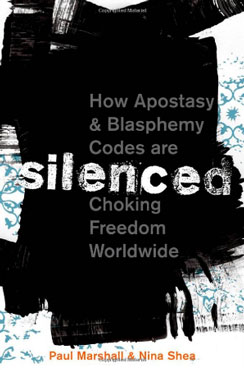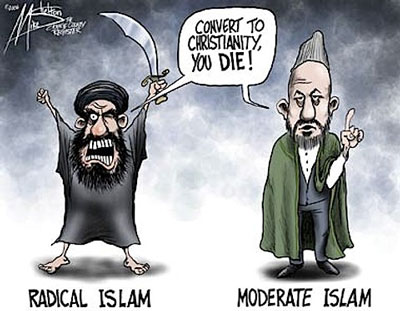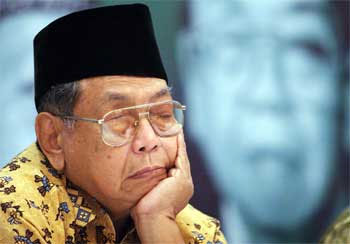
|
| Silenced: How Apostasy and Blasphemy Laws are Choking Freedom Worldwide
by: Paul Marshall and Nina Shea Publisher: Oxford University Press Published: October 31, 2011 English 480 pp. ISBN: 0199812284 ISBN-13: 978-0199812288 |
THINK-ISRAEL |

|
| Silenced: How Apostasy and Blasphemy Laws are Choking Freedom Worldwide
by: Paul Marshall and Nina Shea Publisher: Oxford University Press Published: October 31, 2011 English 480 pp. ISBN: 0199812284 ISBN-13: 978-0199812288 |
Apostasy is, in principle, subject to sharia hudud rules, which means that the punishment — death — is believed to be fixed by divine order and not subject to judicial discretion...," -- Paul Marshall and Nina Shea

Silenced falls far short of the landmark study it might have been, had the authors honestly addressed foundational Islamic principles, history and texts that support offending modern codes, and stated the stupefyingly consistent and pervasive use of sharia laws throughout Muslim history. Specifically, hudud refer to Islamic behavioral limits thought divine[1] since Mohammed established the creed. Sharia's heavenly status and its stubborn exercise rest squarely on Koran[2] (considered sacred and immutable) and sunnah, or "traditions."[3] The latter includes hadith and sira,[4] Mohammed's recorded speech and deeds; and his life (usually,[5] the Ibn Ishaq[6] biography). Apostasy[7] — rejecting Islam — is but one offense to divinity. Adultery[8] similarly requires capital punishment,[9] and theft[10] demands amputation.[11]
To assert that hudud are rarely enforced,[12] or fearing them is "lunacy,"[13] as do Sadiq Reza and other Islamic law professors, is sheer absurdity. But readers of Silenced will not learn here that the horrors the book describes represent unadulterated use of classical hudud and sharia laws, as always practiced.

In order "to show that such temporal punishments are not required by Islam," the authors deliberately avoid discussing the history of apostasy and blasphemy laws and "systematic treatment in Islamic jurisprudence and theology" (p. 287). They leave that topic to "three noted Muslim scholars" whose essays they include. The Nahdlatul Ulama[14] (NU) party provided the forward by the late Indonesian president, reputed Muslim reformer Abdurahman Wahid (1940-2009). Wahid misleadingly casts the "original" meaning of apostasy (as named in the index), and its required punishment — death-- as only
"the legacy of historical circumstances and political calculations stretching back to...early ...Islam, when apostasy generally coincided with desertion from the caliph's army and/or rejection of his authority and thus constituted treason.... [E]mbedding (i.e. codification) of [its] harsh punishments...into Islamic law [is] a...byproduct of these circumstances, framed [by] human calculations and expediency, [not] the eternal dictate of Islam sharia on the issue...."The...development and use of the term sharia to refer to Islamic law often lead those unfamiliar with [it] to conflate man-made law with its revelatory inspiration, and...to elevate to Divine [status] products of human understanding, ... necessarily conditioned by space and time.
Wahid further attempts to distinguish sharia and its purported embodiment of "perennial values" from Islamic law. He says the latter resulted from "itjihad (interpretation)," depends on circumstance (al hukm yadur ma'a al'illah wujudan wa 'adaman) and must be "continuously reviewed" to adapt and prevent Islamic law from obsolescence, rigidity and failing to connect with contemporary Muslim lives and sharia's own "perennial values." He thus claims that Islam's greatest fiqh (jurisprudence) scholars, were "deeply grounded in tassawuf," Islamic mysticism, and balanced "the letter of the law with the spirit" of accommodation to differing culture and practice across the Maghreb, Sahara, sub-Saharan Sahel region, southern Africa, Persia, Asia, the East Indies and the former Roman empire.
Reformer or not, Wahid headed an Islamic[15] party, co-founded[16] in 1926 Java by his grandfathers, both members of its sharia council, which purveyed strict Islamic law, according to Dr. Andrew Bostom. It required that members follow one of four Sunni schools of (Islamic) law — of "Muhammad bin Idris As-Shafi, Imam Malik bin Anas, Imam Abu Hanifa or Imam Ahmad bin Hanbal — and to do everything beneficial to Islam." Al-Shafi'i (d. 820) himself interpreted Koran 2:217[17] "to mean that the death penalty should be prescribed for apostates," the scholar Ibn Warraq explains in Leaving Islam.[18] [1]
Moreover, all Sunni sharia schools had closed the "gates of itjihad," freedom to interpret, 500 years ago.[19] Lately, a few conservative Sunnis favor its reinstatement. Yet the Shi'a kept "benefits of ijtihad"[20] alive, and witnessed no modern reforms, notes analyst and retired U.S. Army officer W. Patrick Lang. Iran maintains draconian sharia-based laws. Its current-day effects are detailed in chapter three.
Ultimately, Wahid failed[21] to improve Indonesia's political landscape. Educated at Islamic schools,[22] he joined NU at his grandfathers' behest[23] and took over in 1984, planning a secular "religious movement"[24] to give social progress[25] to all. He opposed Islamic supremacism.[26] Muslims reacted violently.[27] In 1998, as Suharto stoked anti-Chinese riots, Wahid sought calm to no avail. Hardline Muslims[28] burned Chinese homes[29] and shops, raped hundreds and killed at least 1,000 — just as they had 100,000 ethnic Chinese in the mid-1960s.[30] Wahid opposed East Timor's secession, although before its 2002 independence, he apologized[31] for Indonesia's 1978 occupation and atrocities. Yet jihadis continued to attack Javanese and Maluku Christians[32] (often with military aid),[33] raided dozens of villages,[34] forced thousands to convert and killed at least 5,000.[35] Genocide has raised Indonesia's Muslim population to nearly 90%[36] of its total.
The late Muslim reformer Nasr Hamid Abu-Zayd (1943-2010) wrote "Renewing Quranic Studies in the Contemporary World." Although director of the International Institute of Quranic Studies (IIQS), he was declared an apostate[37] by Egypt's Court of Cassation (its highest). He fled. His marriage was forcibly dissolved. He viewed Koran from an "objective historical perspective," asked how it "was transmitted, propagated, codified, and ultimately canonized," and sought "interpretive diversity." He condemned blasphemy and apostasy laws projecting Koran as "eternal and uncreated," and opposing modern concepts and life principles of freedom, justice, "human rights and dignity of man...."
Indeed, apostasy and blasphemy laws embedded in 1400 years of Islamic jurisprudence prohibit such thoughts. In Sept. 1978, the fatwa council at Cairo's al-Azhar University,[38] the closest Muslim equivalent to the Vatican, issued an official ruling on the case of an Egyptian emigre and convert to Christianity:
"...This man has committed apostasy; he must be given a chance to repent and if he does not then he must be killed according to Shariah."As far as his children are concerned, as long as they are children they are considered Muslim, but after they reach the age of puberty, then if they remain with Islam they are Muslim, but if they leave Islam and they do not repent they must be killed and Allah knows best."[2]
Finally, a chapter on reform of classical Muslim apostasy and blasphemy laws came from Maldives-native Abdullah Saeed, the Sultan of Oman Arab and Islamic studies professor at Australia's University of Melbourne. He includes an internet fatwa[39] by Muhammad Salah al-Munajjid on punishment of a murtadd,[40] referencing the classical Bukhari hadith,[41] "if someone changes his religion, kill him." Like Wahid, Saeed insists on the socio-political genesis of apostasy's prescribed punishment that specified those "in a state of war against Muslims." It was more "akin to treason" than a simple matter of changing one's belief. He also argues that "clear textual proofs that guarantee certainty of knowledge ('ilm qat'i) were lacking in this debate." If any, his second thought would most likely gain limited acceptance by Muslim jurists in 2011. Ordinary Muslims and non-Muslims in Islamic regions increasingly oppose classical apostasy laws and other religious restrictions, he writes, increasingly pressuring them to comply with human rights standards like the U.N.'s Universal Declaration of Human Rights[42] of 1948. Yet Saeed's own homeland banned the 2004 book on apostasy, co-authored with his brother and former Maldives attorney general Hasaan Saeed, on which he based this chapter.
How ready are Muslim jurists to change? The evidence suggests, not very.
The hopes of Muslim reformers put them sharply at odds both with present-day reality and age-old Islamic conventions. Usefully, the book does catalog myriad effects of current legal codes for eight Muslim nations and regions, mostly penalties for allegedly criticizing or rejecting Islam. In Part II, chapters note dozens of cases that ended in execution, murder, or exile. Readers little aware of legal doctrines ruling Muslim nations, regions and groups likely will find their dire results quite shocking.
Saudi Arabia, "perhaps the most repressively controlled Muslim country in the Sunni world," often victimizes citizens and foreigners, alike. Not for over 300 years[43] have North American courts routinely tried people for witchcraft. But sorcery charges often precede Saudi death sentences, as for Lebanese Shi'a TV psychic Ali Hussain Sibat after his May 2008[44] Medina pilgrimage. In prison[45] for 30 months, he won (with foreign help), a new trial[46] and alternative, deportation.[47]
But few escape. In Sept. 2011, Sudanese Abdul Hamid al-Fakki[48] was beheaded for alleged "witchcraft and sorcery."[49] A sharia court in 2008[50] condemned an illiterate and ill Fawza Falih for allegedly causing a man's impotence. In 2011[51] officials admitted[52] she had choked on food[53] and died in prison[54] last year.
Under the Saudi takfir[55] principle (p. 30-31), Muslims may likewise accuse others[56] of leaving Islam — and often do. Those letting men and women to mix at school or work are infidels. "Either he retracts or he must be killed," said sheikh Abd al-Rahman al-Barrak in Feb. 2010. "He who casts doubt about their infidelity leaves no doubt about his own infidelity," wrote Grand Mufti Bin Baz in a 2005 Saudi government brochure at its U.S. embassy, of an unnamed European cleric who had said "declaring Jews and Christians infidels is not allowed," instantly making the cleric a murder target. Similar Saudi tracts denounce "innovative imams" as "heretics [whose] prayers are invalid."
Egypt also commonly alleges apostasy,[57] despite contrary claims by sharia law professor Reza.[58] "Islamic jurisprudence is the principle source of legislation," Anwar el-Sadat added to constitution Article 2 in 1971 (p. 62). Thus Muslims often use the hisba doctrine to legally prosecute those considered "harmful to Islam," chiefly against traditionally repressed[59] religious minorities[60] like Coptic Christians.[61] In fact, penal code article 98 (f)[62] criminalizes "ridiculing or insulting heavenly religions,"[63] facilitating frequent charges of blasphemy and apostasy from Islam — the only faith to which Egypt applies the statute.
In Jun. 1992, days after al-Azhar University clerics listed free thinker Farag Foda first among "helpers of evil,"[64] two al-Jama'at al-Islamiyya members shot him dead. Foda sought to separate mosque and state. He exposed Islamic atrocities from first caliph Abu Bakr to the end of Abbasid Arab caliphate. And at Cairo's Jan. 1992 book fair, he debated orthodox clerics whose fatwas he had mocked (including that against Salman Rushdie).[65] At their trial, Muslim Brotherhood cleric Mohammed al-Ghazali[66] defended Foda's killers, noting that any Muslim could kill an apostate (p. 74).
Pakistan's blasphemy laws, instituted in 1980 under Zia al Haq, have also abetted minority persecution. State sharia courts value male non-Muslim testimonies at half that of Muslims, and of non-Muslim women, one fourth (p. 86). Hundreds of Christians have been prosecuted, far more proportionately than their two percent of the population. Believing Christians natural blasphemers,[67] Muslims easily act on cues to attack,[68] murder,[69] and burn homes[70] and churches.[71] They target Hindus, Sufis[72] and even Muslims, stoning[73] men for alleged blasphemy, or for simply stating what a Westerner considers common sense.[74]
Conditions vary only slightly elsewhere in the Muslims world, and the authors supply a long list of atrocities committed against victims of blasphemy or apostasy accusations. Such charges and attacks occur almost as regularly as clockwork — precisely because they track classic sharia, a key point the authors omit.

Part III reviews parallel efforts at the United Nations to globally bar "defamation of religion," a thinly veiled attempt to shield Islam alone from criticism. The chief culprit is the 57-nation Organization of Islamic Cooperation (OIC), a Saudi-based and funded organization founded in 1969[75] (as the Organization of the Islamic Conference). Here again, the book focuses on modern, Western hate-speech statutes and the real-world effects of limits that resulted from worldwide OIC pressure — not the foundational sharia law upon which the OIC built its frighteningly successful campaign.
The names and events that fill this 113-page section have also filled the pages of savvy online news magazines and channels for well over a decade now, and will be familiar to most who have paid more than glancing attention to the innumerable attacks on genuinely open-minded, free-thinking individuals of all persuasions. If nothing else, it is useful to have brief but well-documented studies of dozens of cases all in one place. Readers are reintroduced to Satanic Verses author Salman Rushdie, whose Norwegian publisher William Nygaard was in 1993 shot three times but survived. Also reported: the unusual genesis of 12 cartoons of Mohammed published in late 2005 by Denmark's Jyllands Posten and the global repercussions. After illustrators refused to sign their own work for Kare Bluitgen's biography of Mohammed for children, editor Flemming Rose commissioned the cartoons in protest of self-censorship in a Western democracy. Within weeks, the newspaper required security protection.
As I reported in Feb. 2006,[76] Muslim Brotherhood and Hizb Ut Tahrir cleric Issam Amayra had the previous spring had incited Muslims in Denmark — from Jerusalem's al Aqsa Mosque — to launch jihad there. [3] A jihad plot began months before Flemming Rose dreamed of commissioning Mohammed cartoons. Jyllands Posten merely supplied the excuse to trigger global riots. In Jan. 2006, trigger it the OIC did.[77] Violent "reaction" to the cartoons went viral after the paper refused to back down and Denmark's prime minister refused to meet with Muslim ambassadors. A call by Muslim Brotherhood "spiritual leader" Yusuf Qaradawi for a U.N. Resolution against "affronts to prophets" set off thousands of Mideast "demonstrations," Pakistani attacks on Christians and on and on. As recently as Jan. 2010, a Somali man attacked the home of cartoonist Kurt Westergaard, then 74.
In addition to additional Muslim reformers, the book covers several other cases of apostates, Christian converts and former Muslim critics, including the especially heroic Ibn Warraq[78] and former Syrian physician Wafa Sultan[79] (280-286), most of them fairly. It cannot go without comment, however, that the authors seriously insult Dr. Sultan: "She maintains that many verses in the Koran say that you must kill those who do not believe in Allah," they write (p. 283). Or, Koran may not say it, she just thinks so.
To set the record straight, Koran 2:217[80] states:
"They ask thee concerning fighting in the Prohibited Month. Say: "Fighting therein is a grave (offense); but graver is it in the sight of God to prevent access to the path of God, to deny Him, to prevent access to the Sacred Mosque, and drive out its members." Tumult and oppression are worse than slaughter. Nor will they cease fighting you until they turn you back from your faith if they can. And if any of you Turn back from their faith and die in unbelief, their works will bear no fruit in this life and in the Hereafter; they will be companions of the Fire and will abide therein."
If commentary by the founder of Sunni Islam's Shafi school (cited above) insufficiently explains its classical meaning, consider the exegesis on 2:217 by 13th century Maliki jurist Qurtubi (d. 1273):
"Scholars disagree about whether or not apostates are asked to repent. One group say they are asked to repent and, if they do, they are not killed. Some say they are given an hour and others a month. Others say they are asked to repent three times, and that is the view of Malik [founder of the Maliki school of Islamic Law]..It is also said they are killed without being asked to repent."[5]
Additionally, Islamic jurists routinely cite Koran 4:89,[81] which states:
"They but wish that ye should reject Faith, as they do, and thus be on the same footing (as they): But take not friends from their ranks until they flee in the way of God (From what is forbidden). But if they turn renegades, seize them and slay them wherever ye find them; and (in any case) take no friends or helpers from their ranks;"
Baydawi (d. 1316) writes on 4:89: "Whosoever turns his back from his belief [irtada], openly or secretly, take him and kill him wheresoever ye find him, like any other infidel." [6]
One hopes Silenced will spur readers to question the founding purpose of the OIC, which the authors do not detail. The Saudis established the it in 1969 to follow classical sharia and Muslim Brotherhood principles, and in 1973 created the Islamic Development Bank to advance the "Islamic way of life." Its biggest project: the 1990 Cairo Declaration of Human Rights in Islam,[82] which 57 members signed.
Significantly, the preamble opens with the ummah's keen awareness[83] of "the place of mankind in Islam as viceregent of Allah[84] on Earth,"[85] a clear reference to Koran 3:110[86] and expected Islamic supremacy:
"Ye are the best of peoples, evolved for mankind, enjoining what is right, forbidding what is wrong, and believing in Allah. If only the People of the Book had faith, it were best for them: among them are some who have faith, but most of them are perverted transgressors." [4]
Not coincidentally, the OIC convened for the so-called Cairo declaration shortly after the Feb. 1989 fatwa of Iran's Ayatollah Ruhollah Khomeini, calling upon Muslims worldwide to track down U.K. citizen Salman Rushdie and execute him. Members agreed, the declaration would serve as their guide on "human rights." These rights, its preamble specified, reaffirm the "civilizing and historical role of the Islamic ummah [nation]" divinely made "as the best community" to give "humanity a universal and well-balanced civilization" and to establish "harmony between" temporal and the afterlife and fulfill Muslim "expectations...to guide all humanity," confused by conflicting beliefs and ideologies.
The OIC Cairo declaration proposed to contribute to global assertion of "human rights, to protect man from exploitation and persecution, and to affirm his freedom and right to a dignified life," but only in accordance with sharia. Briefly, it supports the opposite of "human rights" in the West: unequal[87] rights.
The OIC, then, functions chiefly as a rising barricade -- dangerously invisible to Western leaders, journalists and educators -- to cow and herd free-thinking Western democracies on every continent into ever-tightening iron-clad boundaries to guard Islam against free speech, which the authors understand, despite their seemingly wishful thinking.
The book paints a global landscape, exposing a decades-long campaign to silence Islam's internal and external critics via modern legal principles that clearly offend basic human rights. Example after example shows Muslims, through acts,[88] expressing the belief that their creed, alone, is beyond criticism. Their actions suggest that many Muslims feel specially licensed to demand "cultural respect," plus suppress infidels in their homelands, and everywhere else. Particularly those wanting equal human rights for all, even freedoms of faith and speech — free enough to criticize Muslim theology and Islam.
Further examples continue to accumulate daily. In Iran, Christian pastor Yousef Nadarkhami, now 32, has lived precariously under a sword of Damocles[89] since his 2009 arrest for apostasy — and converting from Islam at age 19. In 2010, he was convicted of apostasy and sentenced to death, though Iran now claims he was sentenced for rape. The mainstream press has remained largely silent[90] over this outrage, albeit among many in Iran. Meanwhile in Paris, Islamic thugs bombed the office of[91] satire magazine Charlie Hebdo[92] (a Gallic version of Britain's Private Eye[93]) after its latest cover changed its name to Charia Hebdo[94] and listed Mohammed as a "guest editor" to mock Tunisian and Libyan Islamic law.

Yet Daily Beast[95] (in the U.S.) headlined the satirical cover — not the bombing -- as "shocking." I'm choking.
Sadly, however, Silenced does not address the most important fact: Egregious violations of basic human rights, heretofore, have stemmed directly from Islamic texts — the Koran, hadith and sira — not only "human interpretation" thereof. In the Koran itself (3:110)[96] originated the claim that Muslims are the best of peoples, notes Australian writer Geoff Dickson.[97] [4] Muslim jurist Ibn Kathir (1301-1373) in his tafsir (exegesis) explains the verse to mean:[98]
"You are the best of peoples ever raised up for mankind; you enjoin Al-Ma`ruf (all that Islam has ordained) and forbid Al-Munkar (all that Islam has forbidden), and you believe in Allah. And had the People of the Scripture (Jews and Christians) believed, it would have been better for them; among them are some who have faith, but most of them are Fasiqun (rebellious)."
Theoretically anything is possible. So, theoretically, is Islamic reform. But the rest of humanity meanwhile deserves and needs the truth about Islamic expansionism and irredentism, including where and how those beliefs and practices originated.
FOOTNOTES
[1] http://www.youtube.com/watch?v=ezVtdAScQrs&feature=player_embedded
[2] http://www.thefreedictionary.com/hudud
[3] http://en.jurispedia.org/index.php/Islamic_law_sources
[4] http://www.islam-watch.org/index.php?option=com_content&task=view&id=822
[5] http://www.faithfreedom.org/Articles/sira/index.htm
[6] http://www.amazon.com/Life-Muhammad-I-Ishaq/dp/0196360331
[7] http://islamqa.com/en/ref/12406/apostasy
[8] http://www.thereligionofpeace.com/Quran/001-adultery_punishment.htm
[9] http://www.iran-e-azad.org/stoning/women.html
[10] http://web.archive.org/web/20040510084824/http:/www.studying-islam.org/articletext.aspx?id=625
[11] http://law.jrank.org/pages/664/Comparative-Criminal-Law-Enforcement-Islam-Theft-sariqa.html
[12] http://www.youtube.com/watch?v=idiBXPFQSP4&feature=player_embedded
[13] http://thesilentmajority.wordpress.com/2011/09/08/ny-law-school-symposium-sharia-in-america-kristen-stilt-audio-day-2/
[14] http://www.americanthinker.com/blog/2011/09/indonesian_islam_and_nahdlatul_ulama_without_camouflage.html
[15] http://www.americanthinker.com/blog/2011/09/indonesian_islam_and_nahdlatul_ulama_without_camouflage.html
[16] http://books.google.com/books?id=VLyk2UxFqTYC&lpg=PP1&vq=Bisri%20Syansur&dq=editions:ISBN0868404055&pg=PA38
[17] http://qb.gomen.org/QuranBrowser/cgi/bin/reveal.cgi?version=pickthall+yusufali+khan+shakir+sherali+khalifa+arberry+palmer+rodwell+sale+transliterated&layout=auto&searchstring=002:217
[18] http://www.amazon.com/Leaving-Islam-Apostates-Speak-Out/dp/1591020689/ref=sr_1_1?ie=UTF8&qid=1320329503&sr=8-1
[19] http://www.washingtontimes.com/news/2006/mar/11/20060311-102357-7196r/?page=all#pagebreak
[20] http://turcopolier.typepad.com/sic_semper_tyrannis/2006/03/the_gate_of_ijt.html
[21] http://testfeer.wsj-asia.com/reviews/2008/april/riots-pogroms-jihad-religious-violence-in-indonesia
[22] http://books.google.com/books?id=SvVt8yyVi_4C&lpg=PA127&ots=TdYCPo-EHJ&dq=May%2013,%201998,%20indonesia,%20riots,%20Abdurrahman%20Wahid&pg=PA59
[23] http://books.google.com/books?id=VLyk2UxFqTYC&lpg=PP1&vq=Bisri%20Syansur&dq=editions:ISBN0868404055&pg=PA112
[24] http://books.google.com/books?id=9Jw9GFsQ55gC&lpg=PA324&ots=0w8J80uqtF&dq=Syuriah%20in%20Indonesia%20NU&pg=PA325
[25] http://books.google.com/books?id=SvVt8yyVi_4C&lpg=PA127&ots=TdYCPo-EHJ&dq=May%2013,%201998,%20indonesia,%20riots,%20Abdurrahman%20Wahid&pg=PA60
[26] http://books.google.com/books?id=SvVt8yyVi_4C&lpg=PA127&ots=TdYCPo-EHJ&dq=May%2013,%201998,%20indonesia,%20riots,%20Abdurrahman%20Wahid&pg=PA216
[27] http://books.google.com/books?id=SvVt8yyVi_4C&lpg=PA127&ots=TdYCPo-EHJ&dq=May%2013,%201998,%20indonesia,%20riots,%20Abdurrahman%20Wahid&pg=PA216#v=onepage&q=Abdurrahman%20Wahid&f=false
[28] http://books.google.com/books?id=VLyk2UxFqTYC&lpg=PP1&vq=Bisri%20Syansur&dq=editions:ISBN0868404055&pg=PA235
[29] http://en.wikipedia.org/wiki/May_1998_riots_of_Indonesia
[30] http://www.americanthinker.com/blog/2011/09/indonesian_islam_and_nahdlatul_ulama_without_camouflage.html
[31] http://www.nytimes.com/2009/12/31/world/asia/31wahid.html
[32] http://books.google.com/books?id=SvVt8yyVi_4C&lpg=PA127&ots=TdYCPo-EHJ&dq=May%2013,%201998,%20indonesia,%20riots,%20Abdurrahman%20Wahid&pg=PA184#v=onepage&q=Wahid&f=false
[33] http://www.guardian.co.uk/world/2002/oct/15/alqaida.indonesia?INTCMP=SRCH
[34] http://old.nationalreview.com/comment/comment-duin010202.shtml
[35] http://www.guardian.co.uk/world/2002/oct/15/alqaida.indonesia?INTCMP=SRCH
[36] http://www.philtar.ac.uk/encyclopedia/indon/geness.html
[37] http://www.dhushara.com/book/zulu/islamp/egy.htm
[38] http://atlasshrugs2000.typepad.com/atlas_shrugs/2009/09/rifqa-bary-death-threat-exhibit-a-the-document-fatwa-death-penalty-for-apostasy.html
[39] http://www.islam-qa.com/en/ref/696/punishment%20of%20the%20one%20who%20leaves%20islam
[40] http://www.al-islam.org/organizations/aalimnetwork/msg00228.html
[41] http://faithfreedom.org/debates/Zain50302.htm
[42] http://www.un.org/en/documents/udhr/
[43] http://www.personal.utulsa.edu/~marc-carlson/witchtrial/na.html
[44] http://web.archive.org/web/20100525071845/http:/www.timesonline.co.uk/tol/news/world/middle_east/article7085303.ece
[45] http://www.npr.org/templates/story/story.php?storyId=121715788
[46] http://www.state.gov/documents/organization/160475.pdf
[47] http://www.npr.org/2011/09/28/140870603/the-weekly-standard-more-limited-freedoms
[48] http://www.tnr.com/article/world/96104/saudi-arabia-king-abdullah-al-fakki-execution
[49] http://english.ahram.org.eg/NewsContent/2/8/21715/World/Region/Saudi-Arabia-beheads-Sudanese-sorcerer.aspx
[50] http://www.cbsnews.com/stories/2008/02/14/world/main3829929.shtml
[51] http://judithweingarten.blogspot.com/2011/04/fate-of-saudi-witch-fawza-falih.html
[52] http://www.cncpunishment.com/forums/showthread.php?4909-Saudi-Arabia-Capital-Punishment-News
[53] http://judithweingarten.blogspot.com/2011/04/fate-of-saudi-witch-fawza-falih.html?utm_source=feedburner&utm_medium=feed&utm_campaign=Feed:+blogspot/lMnZ+(Zenobia:+Empress+of+the+East)
[54] http://www.theindependentbd.com/paper-edition/editorial/post-editorial/74626-silence-of-grief-and-quest-for-peace.html
[55] http://www.mideastweb.org/Middle-East-Encyclopedia/takfir.htm
[56] http://books.google.com/books?id=OZbyz_Hr-eIC&pg=PA743&lpg=PA743&dq=takfir
[57] http://frontpagemag.com/2010/10/12/throwing-apostates-to-the-wolves/
[58] http://www.youtube.com/watch?v=idiBXPFQSP4&feature=player_embedded
[59] http://books.google.com/books?id=oPHW_zkTOeMC&pg=PA60&lpg=PA60&dq
[60] http://fordhampoliticalreview.org/?p=146
[61] http://bikyamasr.com/7708/egypt-coptic-man-accused-of-rape-has-trial-postponed/
[62] http://www.cihrs.org/Images/ArticleFiles/Original/230.pdf
[63] http://www.unhcr.org/refworld/docid/4dbe90c4c.html
[64] http://hereticallibrarian.blogspot.com/2007/09/banned-authors-week-farag-foda.html
[65] http://hereticallibrarian.blogspot.com/2007/09/banned-authors-week-farag-foda.html
[66] http://www.nytimes.com/1996/03/14/world/mohammed-al-ghazali-78-an-egyptian-cleric-and-scholar.html
[67] http://www.balaams-ass.com/alhaj/flames.htm
[68] http://www.balaams-ass.com/alhaj/flames.htm
[69] http://www.foxnews.com/story/0,2933,526126,00.html
[70] http://www.house.gov/pitts/initiatives/humanrights/prisoners/masih.htm
[71] http://www.foxnews.com/story/0,2933,175385,00.html
[72] http://www.hudson.org/files/documents/SheaPakistan108.pdf
[73] http://hindu.com/2002/07/07/stories/2002070702591400.htm
[74] http://www.washingtonpost.com/ac2/wp-dyn/A36108-2002May17
[75] http://www.alyssaalappen.org/wp-content/uploads/sharia-financing-and-the-coming-ummah-by-ehrenfeld-and-lappen.pdf
[76] http://archive.frontpagemag.com/readArticle.aspx?ARTID=5519
[77] http://www.nationalreview.com/articles/222480/tithing-terrorists/rachel-ehrenfeld
[78] http://www.youtube.com/watch?v=GbWacy7RCwA
[79] http://www.amazon.com/God-Who-Hates-Courageous-Inflamed/dp/0312538359
[80] http://www.cmje.org/religious-texts/quran/verses/002-qmt.php#002.217
[81] http://qb.gomen.org/QuranBrowser/cgi/bin/retrieve.cgi?version=pickthall+yusufali+khan+shakir+sherali+khalifa+arberry+palmer+rodwell+sale+transliterated&layout=auto&searchstring=004:87-91
[82] http://www1.umn.edu/humanrts/instree/cairodeclaration.html
[83] http://www1.umn.edu/humanrts/instree/cairodeclaration.html
[84] http://www1.umn.edu/humanrts/instree/cairodeclaration.html
[85] http://www.oic-oci.org/english/article/human.htm
[86] http://qb.gomen.org/QuranBrowser/cgi/bin/retrieve.cgi?version=pickthall+yusufali+khan+shakir+sherali+khalifa+arberry+palmer+rodwell+sale+transliterated&layout=auto&searchstring=003:108-112
[87] http://www.oic-oci.org/english/article/human.htm
[88] http://islammonitor.org/index.php?option=com_content&view=article&id=3400:are-muslims-the-best-of-people&catid=173&Itemid=14
[89] http://www.cnn.com/2011/09/30/world/meast/iran-christian-pastor/
[90] http://www.andrewbostom.org/blog/2011/10/02/will-mainstream-american-islam-condemn-pastor-nadarkhani%E2%80%99s-%E2%80%9Capostasy
[91] http://www.dianawest.net/Home/tabid/36/EntryId/1938/Islam-Bombs-Satire-in-Paris-to-Enforce-Sharia.aspx
[92] http://www.google.com/url?sa=t&rct=j&q=&esrc=s&source=web&cd=9&ved=0CF4QFjAI&url=http://www.charliehebdo.fr/&ei=3fuyTqCqBun20gHf4I2eBA&usg=AFQjCNEulzyn6CgJQ0v0gFJrPv49_nXyIg&sig2=Kb3vFkUhi9xr2L6MvR4V8Q
[93] http://www.private-eye.co.uk/
[94] http://youtu.be/hYhOIa_CQeo
[95] http://www.google.com/url?sa=t&rct=j&q=&esrc=s&source=web&cd=9&ved=0CF4QFjAI&url=http://www.charliehebdo.fr/&ei=3fuyTqCqBun20gHf4I2eBA&usg=AFQjCNEulzyn6CgJQ0v0gFJrPv49_nXyIg&sig2=Kb3vFkUhi9xr2L6MvR4V8Q
[96] http://qb.gomen.org/QuranBrowser/cgi/bin/retrieve.cgi?version=pickthall+yusufali+khan+shakir+sherali+khalifa+arberry+palmer+rodwell+sale+transliterated&layout=auto&searchstring=003:108-112
[97] http://islammonitor.org/index.php?option=com_content&view=article&id=3400:are-muslims-the-best-of-people&catid=173&Itemid=14
[98] http://www.quran4u.com/Tafsir%20Ibn%20Kathir/003%20Imran.htm
END NOTES:
[1] "...But whoever of you recants and dies an unbeliever, his
works shall come to nothing in this world and the next, and they are
the companions of the fire forever." As cited from Samuel Zwemmer, The
Law of Apostasy in Islam, pp. 33-35, (see also
http://radicaltruth.net/uploads/pubs/Zwemer-Law of Apostasy.pdf), in Ibn Warraq, ed., Leaving Islam: Apostates Speak Out, (Amherst: Prometheus, 2003), pp. 17, 35. Verse 2:217:
"They ask thee concerning fighting in the Prohibited Month. Say: "Fighting therein is a grave (offense); but graver is it in the sight of God to prevent access to the path of God, to deny Him, to prevent access to the Sacred Mosque, and drive out its members." Tumult and oppression are worse than slaughter. Nor will they cease fighting you until they turn you back from your faith if they can. And if any of you Turn back from their faith and die in unbelief, their works will bear no fruit in this life and in the Hereafter; they will be companions of the Fire and will abide therein."
[2] Pamela Geller, "Exhibit A, the document: fatwa (death
penalty) for apostasy," Atlas Shrugs, Sept. 21, 2009,
http://atlasshrugs2000.typepad.com/
atlas_shrugs/2009/09/rifqa-bary-death-
threat-exhibit-a-the-document-fatwa-
death-penalty-for-apostasy.html (first viewed 9/21/2009).
[3] Jonathan Dahoah Halevi, director of Orient research Group in Toronto, Canada, translated Issam Amayra'a April 2005 sermon from the Arabic.
[4] Koran 3:110, as translated by Yusuf Ali, Yet Another Quran
Browser,
http://qb.gomen.org/QuranBrowser/cgi/bin/
retrieve.cgi?version=pickthall+yusufali+khan+shakir+
sherali+khalifa+arberry+palmer+rodwell+sale+
transliterated&layout=auto&searchstring=003:108-112 (last viewed 11/3/2011).
[5] From Tafsir Al Qurtubi: Classical Commentary of the Holy Qur'an (Volume 1), translated by Aisha Bewley, p. 549, as cited by Dr. Andrew G. Bostom in his Sharia versus Freedom: The Legacy of Islamic Totalitarianism. (Amherst: Prometheus, forthcoming).
[6] From Samuel Zwemer, The Law of Apostasy in Islam, London, 1924/1925, p. 33, as cited by Bostom, in the forthcoming Sharia versus Freedom, id.
Alyssa A. Lappen is a USA-based investigative journalist focusing on
the Middle East and Islam. She is a former Senior Fellow for the
American Center for Democracy and former Senior Editor of
Institutional Investor.
This article appeared November 4, 2011 in Family Security Matters
(http://www.familysecuritymatters.org/
publications/id.10746/pub_detail.asp),